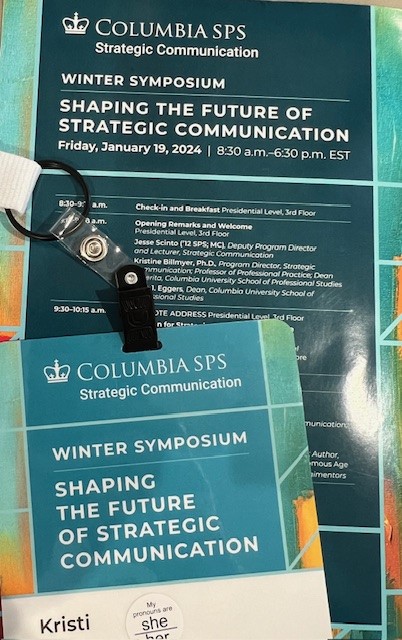
Insights from Columbia’s Strategic Communication Winter Symposium: Shaping the Future of Strategic Communication
I was thrilled to attend CU’s Strategic Communication’s Winter Symposium last week. An advisory board roundtable: “Core Competencies for Rising Communicators,” particularly lit me up.
Deftly moderated by brand strategist and diversity advocate Susan Betts, panel participants also included Amanda Muñoz, Cameron Batten, Jason Cone, Ethan McCarty and Margenett Moore-Roberts – all seasoned and talented comms leaders representing a range of industries and organizations.
“Rising” (and “risen”) comms pros will want to check out the brilliance bombs this brain trust dropped regarding the critical skills strategic communicators need to bring to the table today:
Strategy: “Often times you may have stakeholders who get distracted by that shiny, bright new thing… and you have to go back to your strategy [and ask] “Does that make sense for us? Does that make sense for our brand? What are our goals for our audience?” If it doesn’t make sense for your objective, that’s not money well spent.” (Amanda Muñoz, VP, New Product Go-to-Market & Innovation, Dow Jones/The Wall Street Journal)
Storytelling: “…Whether you’re a chief communications officer, in a mid-level career, or an entry level career, your ability to help either craft or maintain the integrity of the master narrative of your organization … is absolutely essential. It’s the touchpoint for essentially everything you do … If you’re not a good storyteller and you’re not preserving the integrity of that story … and you lose your value, your seat at the table and your relevance. (Jason Cone, Chief Public Policy Officer, Robin Hood Foundation)
Stakeholder Perspective: “Companies are more matrixed than ever before, and you’re often communicating your plan with many stakeholders …You really have to explain the “why” behind what you’re doing …” (Muñoz)
Speed: “If you don’t have the answer, and it’s not credentialed and sourced by the time that you’re finishing the meeting, you’re irrelevant … The folks around me have to be fast when [they’re] trying to convey [our] side of the story in a world of misinformation and disinformation … If you’re not moving fast, you won’t be successful.” (Cameron Batten, SVP & CCO, VW Group of America)
Support: “[It’s] important to dig into the subject matter you’re talking about, and not just saying what it is, but [asking] why it matters for your company or industry and distilling that for your stakeholders. What is the recommendation that you’re providing and doing all that homework to get to those salient points, so that your boss or your CEO doesn’t have to?” (Muñoz)
Responsibility: “Every message that you put out has an opportunity to influence for the good, potentially, to inspire … but also has potential to further negative narratives … It’s a very, very … potent responsibility for communicators because the stories that that we put out in the world, the platforms that we manage, and promote … are very powerful tools in terms of how we shape the collective consciousness of our society and of our culture … All of us need to be aware … that what you put out in the world matters, and have a deep awareness of not only [our] personal reflections and perspective … but also understand how what you’re putting out there will hit the different constituents that you’re trying to reach.” (Margenett Moore-Roberts, Principal Consultant, The Moore-Roberts Group)
Systems Thinking: To be a strategic communicator, you have to take a systems view of the world… We use this … formula all the time at Integral: strategic intention + content, + interactions = experience … You have to think about … individuation of experience within a system… How much daylight is in between who we want to be and who we are, and how is that experienced by many publics? If there’s a big space … you’ve got to figure out what interventions will close it. (Ethan McCarty, CEO, Integral and CU SPS lecturer)
Empathy: “There’s a lot being thrown at us on a lot of complex problems … When we’re communicating, [it’s important to be] thinking about our audiences and where they’re coming from.” (Muñoz)
Two-way Communication: “[The] opportunity for consumers to participate in the process and give you feedback is critical … There’s a way for us to … have a more holistic, more robust, more dynamic narrative … For this next generation of communicators, you can set the tone for the future for the culture, and it’s not a singular point of view, which is where the complexity comes in … (Moore-Roberts)
Distilling Complexity: “To make things accessible is to really wrestle with the complexity of the organization that you’re working for and understand … programmatically what it’s doing. And that requires you to really get in the weeds with the people who are doing it … We don’t have to all be data analysts, and we don’t have to understand everything, but we have to … really wrestle with the complexity of the work to [get to] the real essence of whatever it is [we’re] working on.” (Cone)
Cooperation: “Listening to your partners and understanding … the language on their side [is essential] … The spirit of cooperation is almost a fundamental capability that you have to have now, as you enter this next this next chapter.” (Batten)
Using AI: “There are many distinguishing characteristics of humanity: compassion, empathy, humor… to have real relationships that are durable that are nuanced … multi-dimensional … I think we’re a way off from that with generative AI. The focus … for anyone in the communications industry, when it comes to AI, should be to take as much advantage as possible of using AI to do the perfunctory things you stink at. The worst stuff that I hate doing … copying and pasting … project management … updates … workflows … Robots never tire of that stuff. They eat it up. So that’s … where I’ve been trying to pour my energy: learning how to be the most effective delegator to the automation.” (McCarty)
With more than two decades of communications experience spanning agencies, Fortune-100 organizations, non-profits and academia, Kristi Hinck Mills brings her passion for communications to CommsLede Consulting, where she delivers strategic communication solutions and executive coaching for her clients. Visit the CommsLede blog for more tips.



